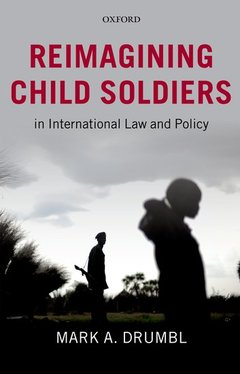Description
Reimagining Child Soldiers in International Law and Policy
Author: Drumbl Mark A.
Language: English
Subjects for Reimagining Child Soldiers in International Law and Policy:
Reimagining child soldiers in international law and policy (paperback)
Publication date: 01-2012
99 p. · 15.5x23.3 cm · Hardback
Publication date: 01-2012
99 p. · 15.5x23.3 cm · Hardback
Reimagining child soldiers in international law and policy (hardback)
Publication date: 01-2012
254 p. · 16.2x24.1 cm · Paperback
Publication date: 01-2012
254 p. · 16.2x24.1 cm · Paperback
Description
/li>Contents
/li>Biography
/li>Comment
/li>
The international community's efforts to halt child soldiering have yielded some successes. But this pernicious practice persists. It may shift locally, but it endures globally. Preventative measures therefore remain inadequate. Former child soldiers experience challenges readjusting to civilian life. Reintegration is complex and eventful. The homecoming is only the beginning. Reconciliation within communities afflicted by violence committed by and against child soldiers is incomplete. Shortfalls linger on the restorative front. The international community strives to eradicate the scourge of child soldiering. Mostly, though, these efforts replay the same narratives and circulate the same assumptions. Current humanitarian discourse sees child soldiers as passive victims, tools of war, vulnerable, psychologically devastated, and not responsible for their violent acts. This perception has come to suffuse international law and policy. Although reflecting much of the lives of child soldiers, this portrayal also omits critical aspects. This book pursues an alternate path by reimagining the child soldier. It approaches child soldiers with a more nuanced and less judgmental mind. This book takes a second look at these efforts. It aspires to refresh law and policy so as to improve preventative, restorative, and remedial initiatives while also vivifying the dignity of youth. Along the way, Drumbl questions central tenets of contemporary humanitarianism and rethinks elements of international criminal justice. This ground-breaking book is essential reading for anyone committed to truly emboldening the rights of the child. It offers a way to think about child soldiers that would invigorate international law, policy, and best practices. Where does this reimagination lead? Not toward retributive criminal trials, but instead toward restorative forms of justice. Toward forgiveness instead of excuse, thereby facilitating reintegration and promoting social repair within afflicted communities. Toward a better understanding of child soldiering, without which the practice cannot be ended. This book also offers fresh thinking on related issues, ranging from juvenile justice, to humanitarian interventions, to the universality of human rights, to the role of law in responding to mass atrocity.
1. Coming of Age in Atrocity. 2. Children Who Soldier: Practices, Politics, and Perceptions. 3. Not So Simple. 4. Child Soldiers and Accountability. 5. Unlawful Recruitment and Use of Children: From Proscription to Prevention. 6. Rights, Wrongs, and Transitional Reconstruction. 7. Reconstellating the International Legal Imagination.
Mark A. Drumbl is the Class of 1975 Alumni Professor at Washington & Lee University, School of Law, where he also serves as Director of its Transnational Law Institute. He has held visiting appointments with a number of law faculties, including Oxford, Paris II (Panthéon-Assas), Trinity College-Dublin, Melbourne, and Ottawa. Drumbl has lectured and published extensively on public international law, international criminal law, and transitional justice. His first book Atrocity, Punishment, and International Law (CUP, 2007) has been widely reviewed and critically acclaimed. He initially became interested in international criminal justice through his work in the Rwandan genocide jails. Drumbl holds degrees in law and politics from McGill University, University of Toronto, and Columbia University.
Drumbl draws on insights from numerous disciplines - developmental psychology, anthropological and ethnographic research, and critical intersectionality theory. He deploys these interdisciplinary insights skillfully to contest contemporary legal fictions...Whether or not one agrees with Drumbl's prescriptions, his book illuminates one of the darkest aspects of current conflicts and reinvigorates the international legal imagination.
© 2024 LAVOISIER S.A.S.




